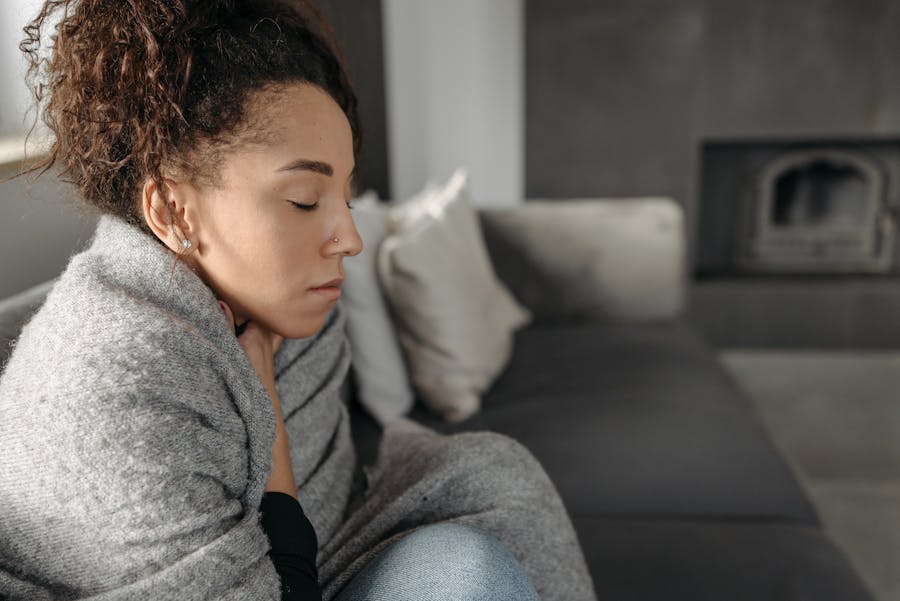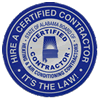It’s 2:17 AM. You wake up because you’re cold. Like, genuinely cold. Not just “forgot the extra blanket” cold, but the kind where you can see your breath hanging in the air above your bed. Your first thought is probably something unprintable, followed immediately by “how cold is it in here?” You grab your phone, stumble to the thermostat, and there it is: your house is 52 degrees and dropping.
Welcome to one of the most unsettling experiences of Alabama homeownership. At Southeastern Mechanical Services, we field these panicked calls regularly during winter months. And honestly? The good news is that you’ve got more options than you think, even at 2 AM with ice on the roads.
First Things First: Don’t Panic (But Do Act Fast)
Your house isn’t going to turn into an ice cave in the next ten minutes. You’ve got time to think clearly. But you also don’t want to wait until morning to address this, especially if temperatures are forecast to stay below freezing. Pipes can freeze, causing thousands in damage. Elderly family members or young children are at risk in prolonged cold. And let’s be real, nobody’s sleeping well when it’s 45 degrees inside.
Immediate Safety Check:
- If you smell gas (like rotten eggs), get everyone out immediately and call the gas company. Don’t mess around with gas leaks.
- Check that your carbon monoxide detectors are working. Some heating failures can create CO risks.
- If you see sparks, smoke, or smell burning from your furnace or heat pump, shut off power to the unit at the breaker.
Once you’ve confirmed there’s no immediate danger, you can start troubleshooting.
The 10-Minute DIY Diagnostic
Before you call anyone (including us), try these steps. You’d be surprised how often the fix is something simple that doesn’t require a middle-of-the-night service call.
Check Your Thermostat
Sounds obvious, right? But we’ve driven through ice storms at 3 AM for dead thermostat batteries more times than we care to admit. Look for a blank screen or dim display. Try replacing the batteries if it’s battery-powered. Make sure it’s actually set to “Heat” mode and the temperature is set higher than the current room temp. Some thermostats have a “Hold” or “Override” setting that might’ve gotten bumped.
Inspect Your Breaker Box
Head to your electrical panel with a flashlight. Look for any tripped breakers. They won’t always be in the full “off” position, sometimes they’re stuck in the middle. Flip the HVAC breaker all the way off, then back on. If it trips again immediately, you’ve got an electrical problem that needs professional attention.
Look at Your Air Filter
A completely clogged filter can actually shut down your system as a safety measure. Pull it out and hold it up to a light. If you can’t see light through it, that’s your problem. Replace it if you have a spare, or at least remove the dirty one temporarily to get through the night.
Check Your Outdoor Unit (Carefully)
If you have a heat pump, bundle up and take a look outside. Is the unit completely encased in ice? Is there excessive snow blocking airflow? Sometimes North Alabama gets that nasty freezing rain that just coats everything. You can carefully clear snow and brush off ice (gently, don’t damage anything), but if the unit is frozen solid, it needs time to thaw or professional attention.
When Phone Troubleshooting Isn’t Enough
So you’ve done the basics and still no heat. Now what?
This is where having a 24/7 emergency service matters. At Southeastern Mechanical Services, when you call our emergency line at 256-686-3444, you’re getting real help even at 2 AM. Here’s exactly what happens:
Your call goes to our professional answering service (always real people, never recordings). They’ll ask some questions about your situation to understand the urgency. They’ll explain our emergency service fee and get your agreement before dispatching. Then one of our certified technicians calls you back, usually within minutes, to do some phone troubleshooting and schedule the emergency visit.
And here’s something most HVAC companies won’t mention: we’ll try to solve your problem over the phone first. If we can walk you through something that gets your heat running again without a truck roll? That’s a win for everyone. No service charge, you’re warm again, and we’ve helped a neighbor out.
The Emergency Service Reality
Let’s talk honestly about emergency calls because nobody likes surprises on their credit card statement at 3 AM.
Emergency service costs more than regular appointments. That’s just reality. You’re paying for a certified technician to leave their warm bed, drive potentially dangerous roads, and show up with a fully stocked truck ready to diagnose and fix problems. We’re transparent about this: there’s an emergency service fee, and parts are additional.
But here’s the thing: if we can’t get your heat running or provide a workable temporary solution within 2 hours of arrival, the service call is free. We stand behind that promise.
Also worth knowing: if your repair needs a specialized part that we don’t have on the truck, supply houses charge significant fees (often $150-225) just to open after hours. When it’s not a true emergency (like temperatures in the 40s instead of the teens), it might make financial sense to use space heaters overnight and schedule a regular service call for morning when all parts suppliers are open.
Your Temporary Survival Plan
While you’re waiting for help to arrive, or if you’re deciding to tough it out until morning, here’s how to keep your family safe and reasonably comfortable. FEMA’s winter weather preparedness guidelines emphasize having a plan before emergencies strike, but we’re past that point now.
Heat One Room
Don’t try to heat your entire house with space heaters or makeshift solutions. Pick one room (usually the largest bedroom or living room) and focus your efforts there. Close doors to other areas. Stuff towels under doors to stop drafts. This creates a manageable warm zone.
Safe Space Heater Use
If you’re breaking out space heaters, follow these rules without exception:
- Keep them at least 3 feet from anything that can burn (curtains, furniture, bedding)
- Never run them unattended or while sleeping
- Plug directly into wall outlets, never extension cords or power strips
- Make sure they have automatic tip-over shutoff features
According to the U.S. Fire Administration, home heating is the second leading cause of U.S. home fires, and space heaters are involved in one out of every six home fire deaths. They’re useful tools but demand respect and constant attention.
Layer Up
Multiple thin layers trap more heat than one thick layer. Hats are crucial because you lose significant heat through your head. Sleeping bags work better than blankets if you have them. And yeah, it sounds silly, but those emergency foil blankets from first aid kits actually do help retain body heat.
Protect Your Pipes
Open cabinet doors under sinks to let warm air circulate around pipes. Let faucets drip slightly, moving water is much harder to freeze. Know where your main water shutoff is in case a pipe does burst.
What NOT to Do (We’ve Seen It All)
Please, please don’t use your oven or stovetop to heat your home. Gas ovens create carbon monoxide in enclosed spaces. Electric ovens aren’t designed for this and create fire hazards. We’ve seen the aftermath of both, and it’s never good.
Don’t use portable propane or kerosene heaters indoors unless they’re specifically rated for indoor use and you have proper ventilation. Carbon monoxide poisoning is silent and deadly.
And resist the urge to keep restarting your heating system if it’s shutting down repeatedly. You might be causing more damage. Let it rest and call for professional help.
The Morning After: Next Steps
So you’ve survived the night, either because you got emergency service or because you toughed it out with space heaters and extra blankets. Now what?
If your heat is still out, call us at 256-686-3444 during regular business hours (Monday through Friday, 7:30 AM to 5 PM). Regular service calls cost less than emergency calls, and we have full access to all parts suppliers during the day.
Even if you managed to get your system running again, consider scheduling a maintenance visit. Whatever caused the failure at 2 AM might be masking other problems. A thorough inspection can catch issues before they cause another midnight crisis.
Prevention: Because 2 AM Failures Are The Worst
Most heating failures happen during the worst possible times because that’s when systems are working hardest. The first really cold night of the season? That’s prime failure time. Here’s how to reduce your odds of joining the 2 AM club:
- Schedule fall maintenance before heating season starts. We check everything that typically fails.
- Replace your filter monthly during heating season. Seriously, this prevents so many issues.
- Keep your outdoor heat pump unit clear of debris, snow, and ice.
- If your system is over 10 years old and acting up, consider replacement before it fails completely.
And honestly? Keep our number programmed in your phone. Because if your heat does go out at 2 AM, you want to be able to call without fumbling through Google searches in the dark.
We’re Here When You Need Us
At Southeastern Mechanical Services, we’ve been the middle-of-the-night call for Decatur families since… well, longer than we like to admit because it makes us feel old. We know North Alabama’s weird winter weather. We understand that heat failure isn’t just inconvenient, it’s a genuine emergency when temperatures drop.
Our emergency line stays open 24/7, 365 days a year: 256-686-3444
We hope you never need to use it at 2 AM. But if you do? We’ll answer. We’ll help troubleshoot over the phone if possible. And if we need to roll a truck, we’ll get there as fast as safely possible with the parts and expertise to get your heat running again.
Because nobody should have to choose between sleeping in their car or shivering through a North Alabama winter night in their own home.
Important Numbers to Save:
- SMS Emergency Line: 256-686-3444
- Decatur Utilities: 256-341-4800
- Alabama Gas Corporation Emergency: 1-800-292-4008
- Poison Control (for CO exposure): 1-800-222-1222
Additional Resources:








